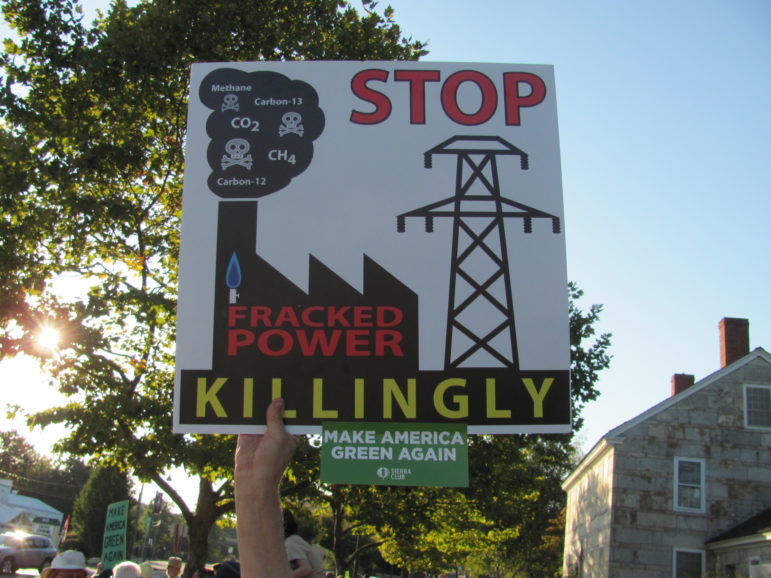It feels like the bloom is off the rose of our country’s love affair with fossil fuels. Connecticut should join in and jilt its gassy lover – and soon, before a Trump administration executive order goes into effect to deny us the chance.
In two days, three major decisions – two in the courts, and one in the business world – have terrified the fossil fuel industry and caused rejoicing among the indigenous, people of color, low-income and environmental/climate communities. I believe it’s part of the sea change that’s been ushered in by the response to the murder of George Floyd, as millions of people of all races, ages, genders, and gender identities, following the leadership of the Movement for Black Lives, have come together to call for the restructuring of our society with equity and justice as guiding principles.
These decisions pulled the plug on the partially built, 600-mile long Atlantic Coast fracked gas pipeline, the already running Dakota Access pipeline (literally pulled the plug in that case, when a judge required the company to drain the oil in the pipeline and conduct a thorough Environmental Impact Statement), and blocked an important environmental permit for the almost 1,200-mile Keystone XL pipeline, which would bring oil sands, the dirtiest of all fossil fuels, across the U.S. from Canada. All these projects were ferociously opposed by coalitions largely led by indigenous people and people of color, including landowners, farmers, ranchers, religious groups and environmental/climate activists.
David Brower, long-time director of the Sierra Club, once said, “Our victories are temporary, but our defeats are permanent.” The powers that be will labor mightily to find ways to resurrect their toxic projects, and in fact many companies were helped in that effort when in the same decision that the Supreme Court issued keeping a halt for now on the Keystone XL pipeline, they released a national hold on water crossings for all other pipeline projects. But for now, this 1-2-3 punch is a balm to our souls. (I’ve been involved in fighting all three pipelines.)
Which brings me to Connecticut. Despite an executive order and a state law committing us to 45% net zero carbon on the energy grid by 2030 and 100% by 2050, we are going the wrong way by building fracked gas power plants and the pipelines to feed them. Two major plants went on line in the past few years, in Oxford and Bridgeport, and the Department of Energy and Environmental Protection (DEEP) continues to grant permits for building a third one in Killingly, to be built by NTE. It needs a 2.4-mile pipeline from Pomfret to Killingly to connect the plant to an existing gas pipeline.
Gov. Ned Lamont is on the record saying he doesn’t want the plant, but seems unwilling to stop it. He should take a page from our neighbor, New York, where Gov. Andrew Cuomo’s administration killed two proposed fracked gas pipelines in the past few years by declining to issue required permits.
Opponents in Killingly and around Connecticut are using lawsuits, community organizing and mobilizing across the state to stop the plant. Last month the CT Climate Crisis Mobilization held a Car Caravan & Virtual Rally to Stop Racial Injustice and Fracked Gas with dozens of cars sporting banners and signs that passed DEEP headquarters, while others stood with banners out front and hosted the Zoom rally.
There is a public hearing on September 24 regarding a wastewater permit NTE needs to build the Killingly plant. People will be testifying against construction, calling for putting people to work in green jobs. We are asking Gov. Lamont and DEEP Commissioner Katie Dykes to pull the plug on this unneeded fracked gas plant and focus instead on building out more renewable energy projects and promoting energy efficiency and energy conservation (the cheapest energy is the energy you don’t use).
People will be testifying against construction, calling for putting people to work in green jobs. We are asking Gov. Lamont and DEEP Commissioner Katie Dykes to pull the plug on this unneeded fracked gas plant and focus instead on building out more renewable energy projects and promoting energy efficiency and energy conservation (the cheapest energy is the energy you don’t use).
I lived through the 1960s and this is the first time since then that I’ve felt the incredible passion and commitment to make sweeping changes in our society. It’s time for bold action, and not a moment too soon; in fact, it’s almost too late. But much better late than never.

 RSS Feed
RSS Feed
